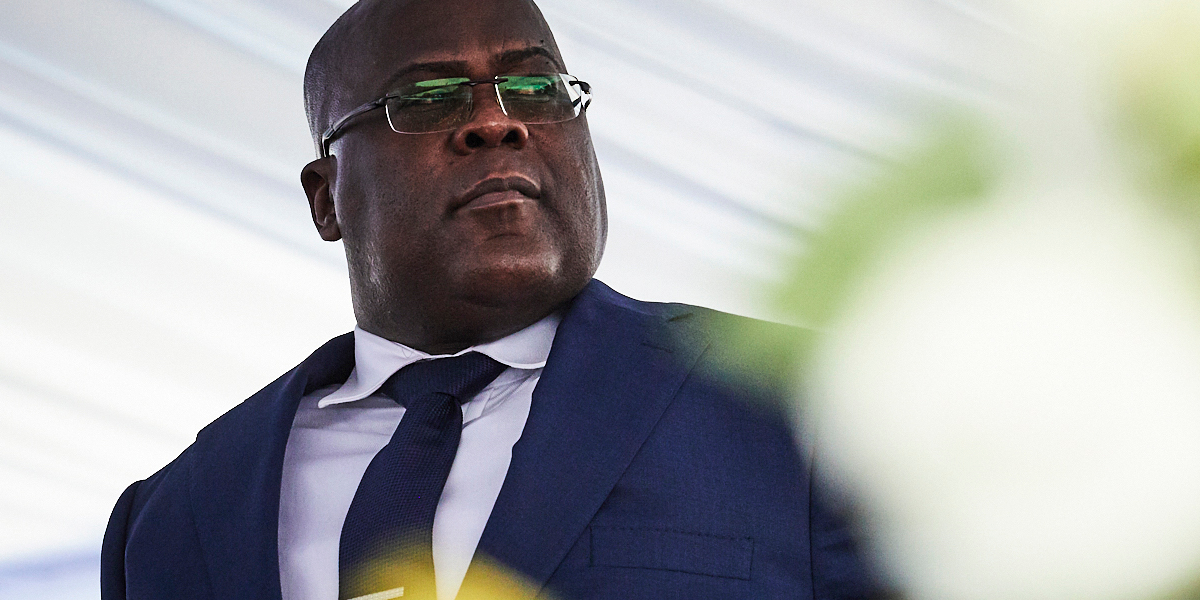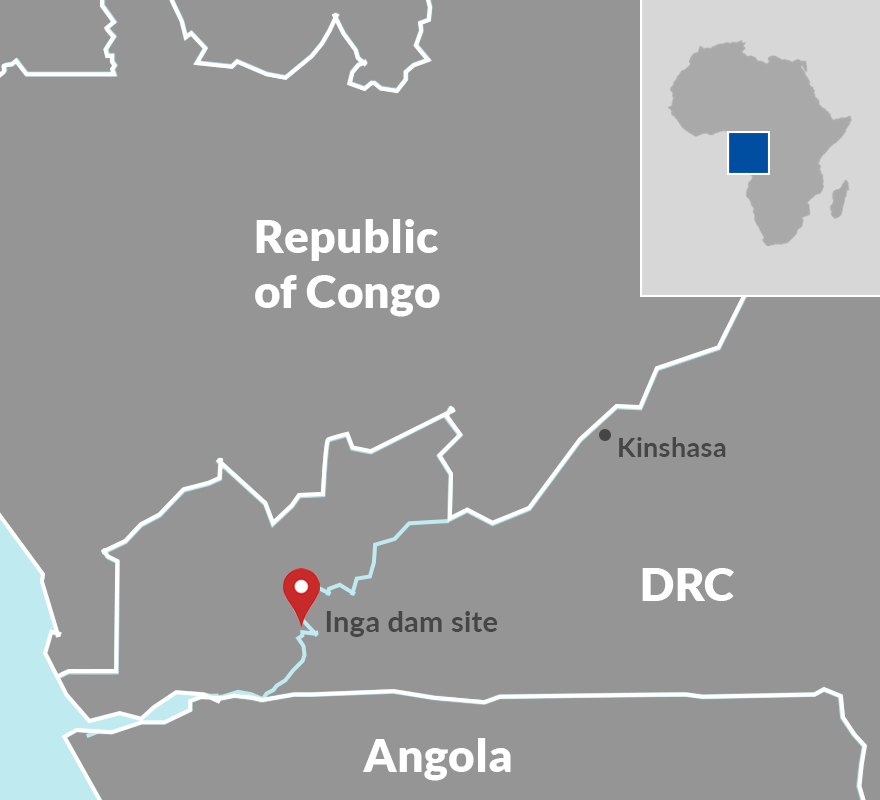Can Tshisekedi really revive DRC’s Grand Inga Dam vision?
- Get link
- X
- Other Apps
By Peter Fabricius• 19 February 2021

DRC President Félix Tshisekedi (pictured) has made Inga a priority, at least rhetorically – not only for the DRC but for Africa. (Illustrative image | Source: EPA-EFE/HUGH KINSELLA CUNNINGHAM) Less
Inga 3 is a priority for the DRC president but is still more about rhetoric and politics than delivering electricity to the nation.
First published by ISS Today
Will Democratic Republic of the Congo (DRC) president Félix Tshisekedi at last turn the Grand Inga Dam mirage into the Grand Inga Dam barrage? The dream of harnessing the mighty Congo downstream of Kinshasa to eventually generate up to 50,000 MW of electricity has been dangled before the largely unelectrified Congolese and the outside world for decades.
Tshisekedi, who took office two years ago, has made Inga a priority, at least rhetorically – not only for the DRC but for Africa. He told parliament on 14 December the 11 GW Inga 3 project, the next phase of Grand Inga, was about to reach financial close. And when he took the African Union chair on 6 February, he presented Inga as a pan-African enterprise – a sign that he would use the continental chair to push Inga 3.


In November 2020, Bruno Kapandji – director of the government’s Agency for the Development and Promotion of the Grand Inga (ADPI) – said construction of the $14-billion Inga 3 dam and hydroelectric plant would begin in 2021. François Misser and Jon Marks wrote in African Energy that 3.5 GW of its 11 GW output would go to South Africa, 4 GW to the Chinese company Chalco to build an aluminium smelter near Inga, and the remaining 3.5 GW to local customers and the Katanga mining industry.
It’s not clear though if this means it’s all systems go. As Misser and Marks write, “The business case is not yet persuasive and details remain vague.” Perhaps most worrying is that no binding power purchasing agreements have yet been signed.
They say the Inga Unified consortium formed in August 2020 comprises six Chinese companies led by China Three Gorges Corporation after Spain’s Actividades de Construcción y Servicios pulled out in January. Another Spanish company, AEE Power Holdings, remains involved in a group with Andritz and Brazil’s Andrade Gutierrez. But the DRC is seeking more partners, which is muddying the waters.
A recent Africa Intelligence report said three of Tshisekedi’s top advisers were jostling for control of the project, each championing a different international consortium of competing contractors. Added to the original largely Sino-Spanish consortium are an Australian mining company and a Sino-American consortium.
Gregory Mthembu-Salter heads South Africa’s Phuzumoya Consulting, which co-authored a report with the Congo Research Group last year arguing against South Africa’s involvement in the Inga project. He believes Tshisekedi has revived it, at least rhetorically, because he promised, on taking office, to raise the proportion of Congolese who have electricity, from around 11% to 30% by 2023.
Many other questions remain unanswered. One is whether Tshisekedi intends to return control of the ADPI to the energy ministry where it resided until former president Kabila brought it directly under his ambit in the presidency in 2016.
That prompted the World Bank to suspend a $73.1-million grant to finance technical assistance, capacity building and studies for the Inga project because it feared that moving the project into the presidency could facilitate corruption. It seems unlikely that Tshisekedi would relinquish that tight control – especially because the African Development Bank has stepped in to make up the $73-million.
Perhaps the biggest question is where Inga’s financing will come from. As Mthembu-Salter notes, South Africa is key here. In 2016, then president Jacob Zuma committed to buying at least 2,500 MW of Inga 3’s output. But Mthembu-Salter questions how the country’s highly indebted power utility Eskom could afford the purchase and then construct the thousands of kilometres of powerlines to transmit it to South Africa.
Yet the Ramaphosa administration put the 2,500 MW from Inga into its energy mix in its October 2019 Integrated Resource Plan (IRP). This despite the Phuzumoya Consulting and Congo Research Group report pointing out that Inga 3 electricity would be significantly more expensive than the alternatives at Eskom’s disposal, such as wind and solar.
Mthembu-Salter suspects Ramaphosa kept Inga in the IRP only for pan-African political reasons, knowing that if the DRC doesn’t produce the electricity by 2023 – which it won’t – South Africa could cancel the deal.
Another problem, for the Congolese people and the outside world, is the lack of transparency around Inga 3. With the ADPI under the president’s office, many important actors have been sidelined according to the Resource Matters and Congo Research Group report: “Civil society, relevant government ministries, and the Congolese Parliament only receive piecemeal updates.”
The report says the DRC never made public the “exclusive development agreement” it had with the Inga Unified consortium. It says there’s nothing in any public documents to guarantee that the Congolese people would get any of the electricity.
A European researcher, who requested anonymity, has been following Inga for years and fears that the whole project remains smoke and mirrors. “[There have been] no binding agreements, no power purchase agreement, no negotiations on tariffs, no bank or corporation financing something more than studies, no investment vehicle, no bankable project so far, no visibility for Eskom or others to plan their energy mix for the next 10 years.”
And so, as the Resource Matters and Congo Research Group report proposes, the first step Tshisekedi should take is on transparency. Stephanie Wolters, Bradlow Fellow at the SA Institute of International Affairs, notes that such a huge project has equally huge potential for corruption. “Tshisekedi has to ensure that the project management and financing of this are in an untouchable project management bubble.”
That means taking the ADPI out of the presidency and establishing it as an autonomous government entity. “That would immediately set the tone that Tshisekedi wanted to make serious progress on this. And that would have a positive impact on all sorts of other investment too.”
And if Inga 3 does, at last, come to fruition, what about the future? A forthcoming Institute for Security Studies report argues that Grand Inga shouldn’t proceed beyond Inga 3.
Instead, Kinshasa should “focus on the fundamentals” of governance, which includes comprehensive household electrification through renewables, using mini- and off-grid electricity solutions. This would provide significantly more benefits than large capital investments on the government balance sheet such as the pursuit of Grand Inga beyond Inga 3. DM
Comments - share your knowledge and experience
Please note you must be a Maverick Insider to comment. Sign up here or sign in if you are already an Insider.
Everybody has an opinion but not everyone has the knowledge and the experience to contribute meaningfully to a discussion. That’s what we want from our members. Help us learn with your expertise and insights on articles that we publish. We encourage different, respectful viewpoints to further our understanding of the world. View our comments policy here.
All Comments 1